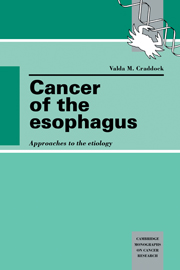Book contents
- Frontmatter
- Contents
- Preface
- List of abbreviations
- 1 Introduction: the problem, incidence, etiology. A working hypothesis
- 2 Biology of the esophagus
- 3 Esophageal carcinogenesis
- 4 Epidemiology
- 5 Chemicals carcinogenic for the esophagus: the nitrosamines
- 6 Alcoholic beverages and tobacco
- 7 Plant products: phenolics, tannins, tea
- 8 Plant products: opium, silica, bracken, dihydrosafrole
- 9 Molds and mycotoxins
- 10 Dietary deficiencies: micronutrients, fresh plant food and protective factors
- 11 Possible mechanisms involved in carcinogenesis
- Index
11 - Possible mechanisms involved in carcinogenesis
Published online by Cambridge University Press: 07 September 2010
- Frontmatter
- Contents
- Preface
- List of abbreviations
- 1 Introduction: the problem, incidence, etiology. A working hypothesis
- 2 Biology of the esophagus
- 3 Esophageal carcinogenesis
- 4 Epidemiology
- 5 Chemicals carcinogenic for the esophagus: the nitrosamines
- 6 Alcoholic beverages and tobacco
- 7 Plant products: phenolics, tannins, tea
- 8 Plant products: opium, silica, bracken, dihydrosafrole
- 9 Molds and mycotoxins
- 10 Dietary deficiencies: micronutrients, fresh plant food and protective factors
- 11 Possible mechanisms involved in carcinogenesis
- Index
Summary
Molecular mechanisms
In the majority of human and experimental cancers, genetic damage is believed to be the initial cause of the disease. Of all the huge number of chemicals which have been tested for carcinogenesis, only N-nitroso compounds have been found to be potent carcinogens for the esophagus. As far as they have been studied, all the nitrosamines which affect the esophagus are metabolized by the target organ, and alkylate DNA at the O6-position of guanine. The mutagenic base which is formed is removed rapidly from liver and several other organs, but not from esophagus (see Chapter 5). As human exposure to nitrosamines from a variety of sources, or formation of the compounds in the stomach, is probably universal, at present these compounds are the main contenders as initiators of esophageal cancer.
In general, very low levels of exposure to carcinogens result in malignancy only if the effects are promoted by a second insult. In animal experiments this can be a high dose of the carcinogen per se, so that it causes cellular damage and restorative hyperplasia. It could well be this increase in replication which is responsible for the promoting effect. In man, consumption of alcoholic beverages is the main cause of esophageal cancer in the West, and intubation of ethanol, especially of ethanol containing the fusel alcohols which are present in many spirits, causes an increase in basal cell replication without initial histological signs of damage (see Chapter 6).
- Type
- Chapter
- Information
- Cancer of the EsophagusApproaches to the Etiology, pp. 272 - 279Publisher: Cambridge University PressPrint publication year: 1993



